Four Baha'i Citizens In Iran Sentenced To 12 Years In Prison
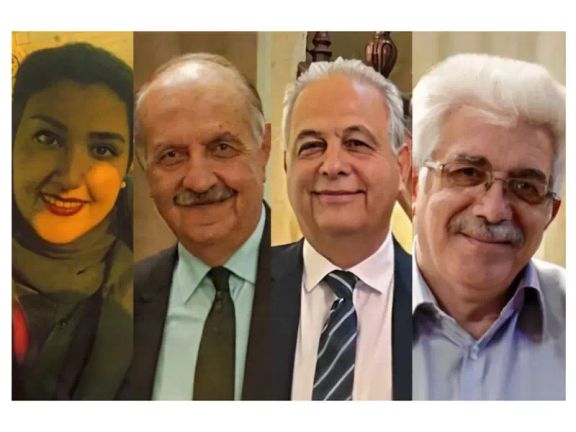
Amid the systematic persecution of Iran's Baha'i community by the Islamic Republic, four citizens have been collectively handed a 12-year prison sentence.

Amid the systematic persecution of Iran's Baha'i community by the Islamic Republic, four citizens have been collectively handed a 12-year prison sentence.
Shadi Shahidzadeh, Mansour Amini, Ataollah Zafar, and Valiollah Ghadamian received individual prison terms of five, three, and two years, respectively. The charges levied against them were related to "membership in illegal groups and associations with the intent of undermining national security," as reported by the US-based human rights advocacy group HRANA on Wednesday.
The Baha'i community is the largest non-Muslim religious minority in Iran loathed by the Shiite clerics and systematically persecuted since the Islamic Republic was established in 1979.
Earlier this year, they had received five-year prison sentences in a court, based on allegations linked to their faith.
Last week, the UK Foreign Office issued a statement stressing the immediate need to cease the harassment and persecution of the Baha'i community by the Islamic Republic. The UK government deemed the ongoing mistreatment of Baha'is as “unacceptable” and called upon the Iranian government to release all Baha'i prisoners, especially those who are elderly, require medical attention, or are in vulnerable situations.
The UK also underscored the importance of the judiciary refraining from imposing excessive bails on Baha'i detainees.
Since September 26, at least eight Baha'i citizens have been apprehended in Shiraz and Yazd. In August, the Baha'i International Community released a statement highlighting the continued suppression of Baha'is, including the arrests of approximately 60 Baha'is and the confiscation of properties belonging to 59 other Baha'is.
The United States House of Representatives also passed a resolution condemning the harassment of Baha'is by the Iranian government. The resolution called for the release of Baha'i prisoners and other individuals detained due to their religious beliefs.
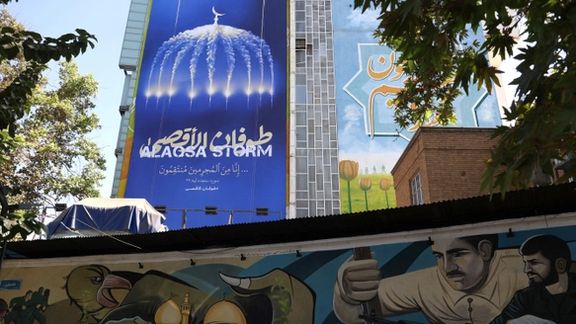
The US considers Iran ‘at least complicit’ in Hamas attack on Israel, the State Department said Tuesday, after insisting it had no evidence of Tehran's direct involvement.
Spokesperson Matthew Miller told reporters the Biden administration is now trying to establish if the regime in Iran or elements within the system contributed to the planning of the attack by Hamas militants.
“Iran likely knew that Hamas was planning operations against Israel, but without the precise timing or scope of what occurred,” Miller told journalists at the State Department’s press briefing.
The Islamic Republic has been supporting Hamas for many years. It’s not yet established, however, how far the IRGC was involved in Hamas’ most recent operation.
Ghazi Hamad, a Hamas spokesman, told the BBC that the group had direct backing for the attack on Israel from Iran. A report in Wall Street Journal suggested the same, quoting unnamed sources from Hamas and Hezbollah.
Iran has denied involvement in the operation, which has killed more than 1,200 Israelis. “They say the Islamic Iran was behind this move… they are wrong… Palestinians did it themselves,” said Supreme Leader Ali Khamanei Tuesday.
On numerous occasions before, he has boasted that his regime has had a hand in confrontations against Israel (like the 33-day War with Hezbollah in 2006) and that Iran will keep on helping “any group that fights the Zionist regime.”
The extent of the regime’s involvement in the Hamas attack, if and when it’s established, would likely inform the nature of the response from Israel and the United States. Many in Washington are already pushing for retaliatory measures, including re-freezing the $6 billion of Iran’s old revenue that was unblocked last month to secure the release of five Iranian-Americans held hostage in Tehran.
US Senators have written to President Biden, demanding that access to the money (currently held in a Qatari bank) be denied.
“The State Department should immediately rescind the waivers that allowed Iranian funds converted and moved to more accessible bank accounts,” reads the lawmakers’ letter to Biden, “as well as work with US ally Qatar to immediately freeze the accounts containing these funds.”
The signatories believe that the $6 billion, even if used solely and entirely for humanitarian purposes, would free up other funds in Iran to be used on other, ‘malign’ activities.
Responding to this argument, the State Department Spokesperson said he could confirm that “not a cent” of the $6 billion has been spent at this point. “And we have the ability to freeze it at any time,” Miller concluded.
Hamas’ attack on Israel has enraged those who believe they had warned the Biden administration of the consequences of its lenient approach to the regime in Iran.
“Concessions to the ayatollahs have made them believe America will not stand up for itself or our allies,” Senator Tom Cotton told Fox News Tuesday, “President Biden must reverse his policies that have emboldened Iran and its terrorist proxies.”
It seems to be an attack line the Republicans would not abandon soon.
“Make no mistake— Hamas's genocidal violence was partly enabled by Biden unfreezing billions of dollars to Iran,” Senator Ted Cruz said Tuesday.
Tim Scott, another Republican Senator who is a ranking member of the Senate Committee on Banking, called for a hearing and an investigation into the ‘release of the $6 billion to Iran’.
“We should be signaling strength - not leniency - when it comes to Iran,” Senator Scott said in a statement Tuesday, “that’s why now is the time to pass my Solidify Iran Sanctions Act and send the message that Iran should not expect U.S. sanctions to lapse.”
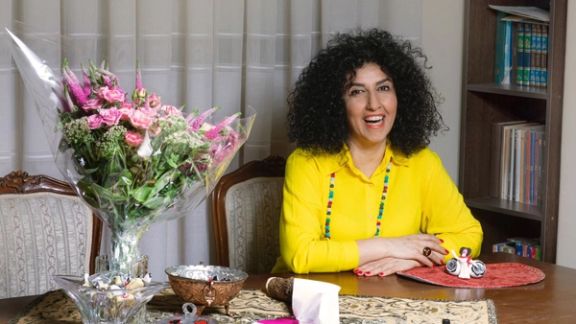
Narges Mohammadi's lawyer reports that Tehran's Evin Prison authorities denied her a meeting on Tuesday because she refused to wear the hijab.
Mostafa Nili, in a tweet, explained that he was informed at the prisoners' visiting hall, after a considerable wait to see his client, that prison authorities had decided not to allow Mohammadi to meet him, ultimately forcing him to leave.
Mohammadi, a prominent human rights activist and physicist who was awarded this year's Nobel Peace Prize, is well-known for her vocal criticism of the Islamic Republic, particularly its compulsory hijab laws and various human rights violations, including the death penalty.
In a phone call quoted on an Instagram account authorized by Mohammadi, she stated that a prison guard had assaulted, threatened, and verbally abused her for not wearing the hijab. This incident took place in the prison clinic in September, in the presence of some prison authorities, resulting in bruises as she was dragged to the prison courtyard. She added that she protested against the maltreatment of another prisoner by shouting that prison guards had no right to threaten inmates and even climbed on a car while chanting "Down with the Islamic Republic."

The Norwegian Nobel Committee, which recognized Mohammadi for her "fight against the oppression of women in Iran and her fight to promote human rights and freedom for all," has called for her release.
In a letter addressed to the European Parliament, Mohammadi reiterated her view that the Islamic Republic is a religious dictatorship and anti-women, urging for "maximum pressure" on the regime to ensure its compliance with human rights and to support Iranian women in their struggle.
Over the past few months, Mohammadi, 51, has penned several letters from Evin Prison, where she has been serving a twelve-year sentence since November 2021 for charges including "propaganda against the Islamic Republic." She has consistently denied these charges, which were brought against her after she issued a statement against the death penalty.
As the co-founder and chairperson of the Defenders of Human Rights Center, Mohammadi has been detained and imprisoned multiple times over the past two decades.
Officials of the Islamic Republic, including Foreign Ministry spokesman Nasser Kanani, have condemned Mohammadi's Nobel Peace Prize as a "politically motivated move" and accused Western governments, including Norway, of pursuing "anti-Iranian and interventionist policies."
Ultra-hardline media outlets, such as the IRGC-affiliated Javan newspaper, have labeled her a "separatist, pro-sanctions Iranian."
Mohammadi has, on various occasions, opposed Western economic sanctions on Iran, arguing that these, combined with the government's economic inefficiency, have led to the impoverishment of the Iranian people and weakened their power. However, she has defended sanctions and travel restrictions imposed on Islamic Republic officials for human rights violations.

Two of Iran’s heavily armed proxy groups in the region have threatened to target US interests if Washington intervenes to support Israel in its conflict with Hamas.
The Houthi Movement in Yemen and a powerful Iraqi militia group both issued identical statements, which can be a sign that Tehran is willing to leverage its loyal proxies to flex its muscle against the United States.
The comments come amid strong support by the United States for Israel's response to the attacks and a US pledge to rapidly provide additional munitions to Israel and deploy a carrier strike group to the Eastern Mediterranean.
In Yemen, the leader of the powerful Houthi Movement warned on Tuesday that the group would respond to any US intervention in Gaza with drones, missiles and other military options.
He said the group was ready to coordinate intervention with other members of the so-called "Axis of Resistance" which encompasses Iranian-backed Shiite Muslim factions in Iraq and Lebanon's Hezbollah group, which has already entered the fray.
The remarks came after the top US general late Monday warned Iran not to get involved in the crisis in Israel and said he did not want the conflict to the broaden, as Lebanese Hezbollah fired rockets onto northern Israel.
The White House earlier on Monday said that Iran was complicit even though the United States has no intelligence or evidence that points to Iran's direct participation in attacks in Israel by Palestinian Islamist group Hamas.
Asked what his message for Iran was, General Charles Q. Brown, the chairman of the Joint Chiefs of Staff, said: "Not to get involved."
Later on Tuesday, President Joe Biden repeated the warning in an address to the nation. "So, in this moment, we must be crystal clear. We stand with Israel. Let me say again to any country, any organization, anyone thinking of taking advantage of this situation, I have one word. Don't. Don't!"
In Iraq, Hadi Al-Amiri, a powerful Iraqi politician close to Iran and a key figure in the cross-party alliance backing the Baghdad government, also threatened to target American assets, in comments made during a tribal gathering in the capital.
"If they intervene, we will intervene...If the Americans intervened openly in this conflict..., we will consider all American targets legitimate..., and we will not hesitate to target it," Al-Amiri said on Monday.
He leads the Badr Organization, a Shi’ite political group supported by Iran that comprises a large part of Iraq's Popular Mobilization Forces (PMF), the state paramilitary organization that contains many Iran-backed factions.
If the US forces intervene in the operation al-Aqsa Storm – the codename for the Hamas attack, “we will target the American bases” as well as Israeli positions, said Abu Hussein al-Hamidawi, the secretary-general of Kataib Hezbollah, a radical Iraqi Shiite paramilitary group and part of the PMF.
The PMF has voiced its "unequivocal support" for the Palestinian factions fighting Israel and the Iraqi government has said the Palestinian operations were a natural outcome of what it calls "oppressive" policies by Israel.
In past years, Iranian-backed militias in Iraq regularly targeted US forces in Iraq and the US embassy in Baghdad with rockets, though such attacks have abated under a truce in place since last year, as Iraq enjoys a period of relative calm.
The United States currently has 2,500 troops in Iraq - and an additional 900 in Syria - on a mission to advise and assist local forces in combating Islamic State, who in 2014 seized swathes of territory in both countries.
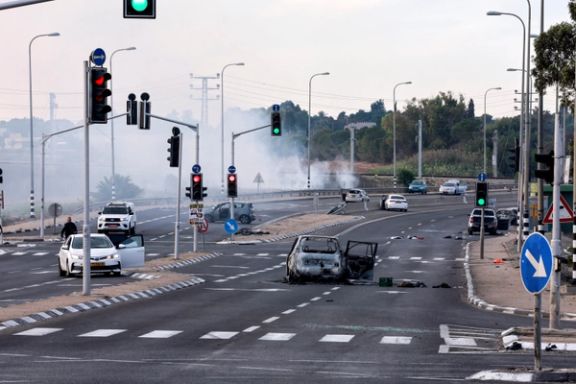
A senior Hamas official said if Gaza were subjected to “a war of annihilation,” allies such as Iran and Lebanese Hezbollah "would join the battle."
Ali Barakeh, a member of Hamas' exiled leadership, shared the remarks during an interview with The Associated Press at his office in Beirut.
The statement was made amid Israel's bombardment of Gaza and its declaration of a complete blockade of the Hamas-controlled territory following a surprise attack Saturday that caught Israel's military and intelligence services completely off guard. It has resulted in the worst military bombardment of the Jewish state in 50 years.
Hundreds of Hamas militants entered by land, sea and air, resulting in the massacre of hundreds of soldiers and civilians, with dozens more taken captive, including women, children and the infirm.
Barakeh claimed that the attack had been planned by approximately six senior Hamas commanders in Gaza and that even their closest allies were unaware of the timing beforehand.
He refuted reports suggesting that Iranian security officials had helped orchestrate the attack or had given approval during a meeting in Beirut the previous week.
The development came after a joint statement issued on Monday by the United States and four European allies, where they reaffirmed their support for Israel. The leaders of the United States, France, Germany, Italy, and Britain emphasized their solidarity with Israel while condemning Hamas.
“We make clear that the terrorist actions of Hamas have no justification, no legitimacy, and must be universally condemned. There is never any justification for terrorism,” read the statement.
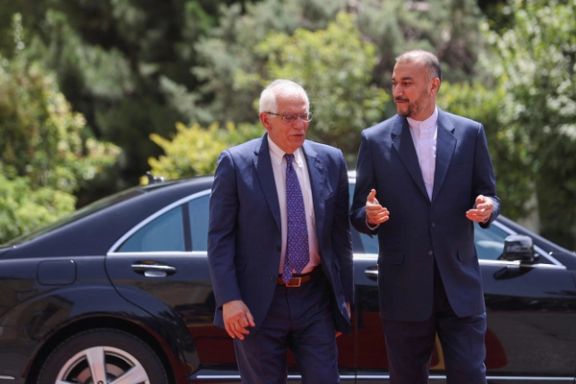
Josep Borrell, the EU's foreign policy chief, reaffirmed his condemnation of the "brutal attacks" on Israel in a phone conversation with the Iranian Foreign Minister.
“Nothing can justify such despicable acts of terror and nothing can justify supporting it,” Borrell said in a message on Tuesday.
However, Iranian Foreign Minister Hossein Amir-Abdollahian claimed that during the phone call he described the attacks as “a natural legitimate reaction to the radical criminal acts of the Zionist Regime and a clear outcome of Netanyahu extremism against the motherland of the Palestinian nation.”
Meanwhile, French President Emmanuel Macron stated on Tuesday that “it’s likely” that Iran assisted Hamas in carrying out the deadly terrorist attack on Israel. However, he noted that Western allies currently lack definitive proof of Iran's involvement.
Macron's comments followed several news reports suggesting Tehran's active role in launching the violent incursion into Israeli territory, resulting in the deaths of over 1,000 civilians.
On Tuesday, Iran’s Supreme Leader Ali Khamenei reiterated Tehran’s support for the militant group’s actions, which he said caused Israel to suffer “an irreparable defeat.”
“This devastating earthquake has managed to destroy some of the key structures of the oppressive regime's governance, the reconstruction of which is not easily achievable,” he said.
Iran promptly congratulated Hamas following its surprise attack on Israel and expressed support for “anti-Zionist resistance in the region.”
Speaking alongside German Chancellor Olaf Scholz at a Franco-German summit in Hamburg, Macron reiterated their strong condemnation of Iran's celebration of the attack.